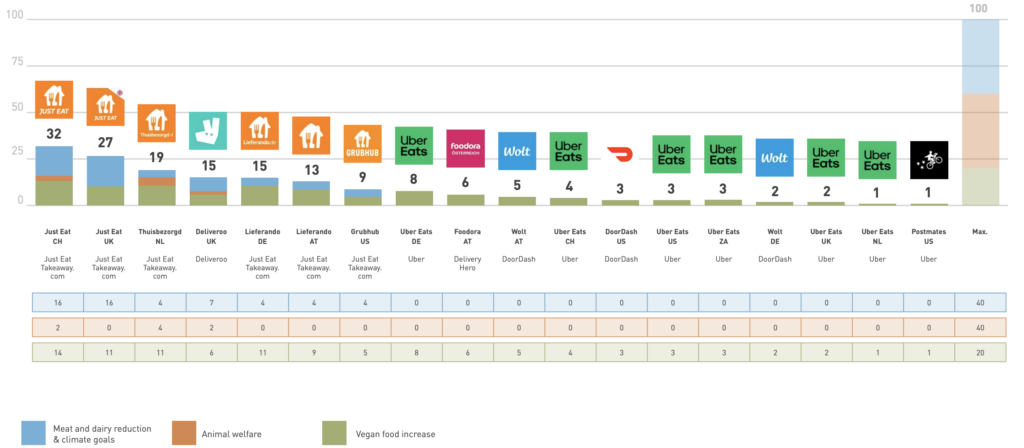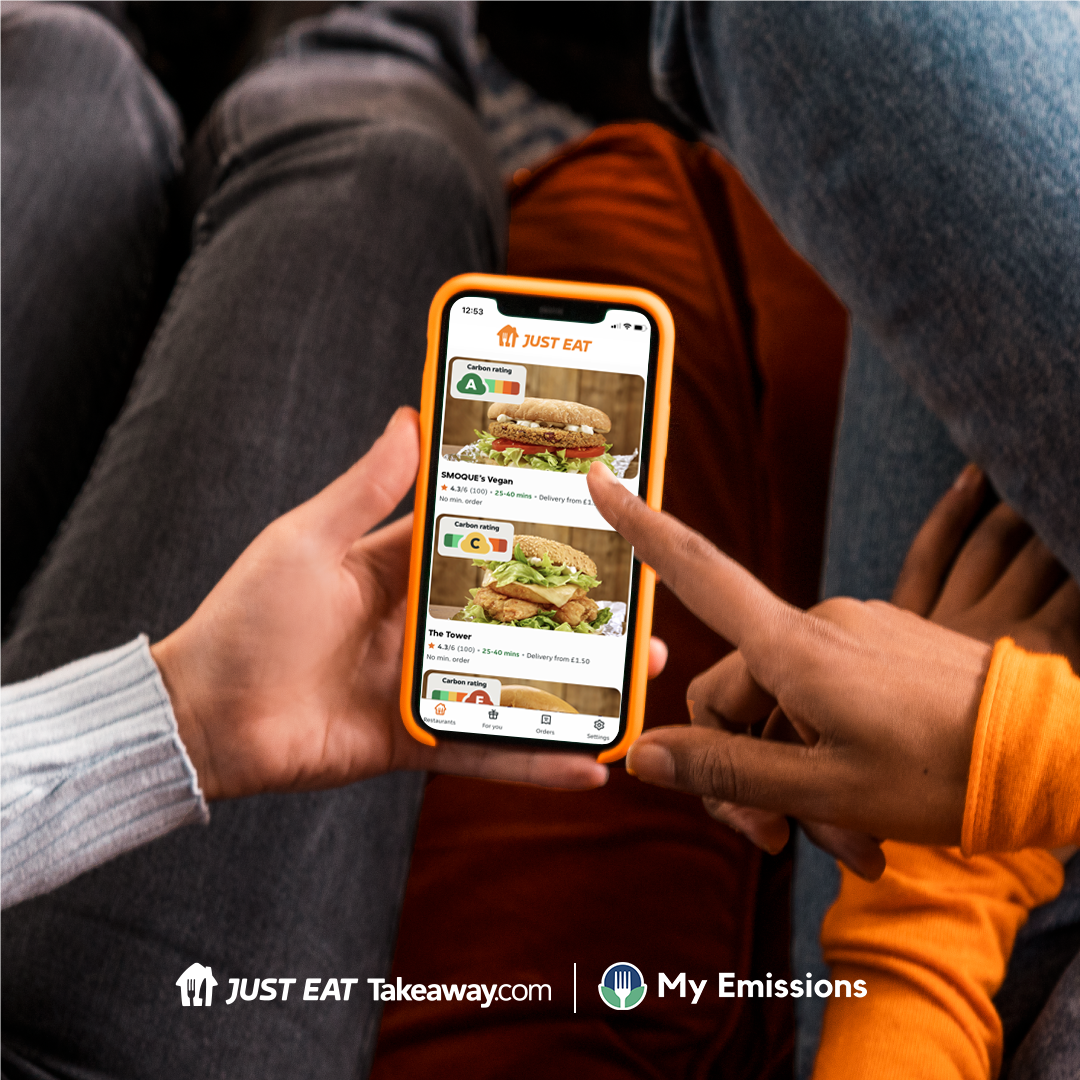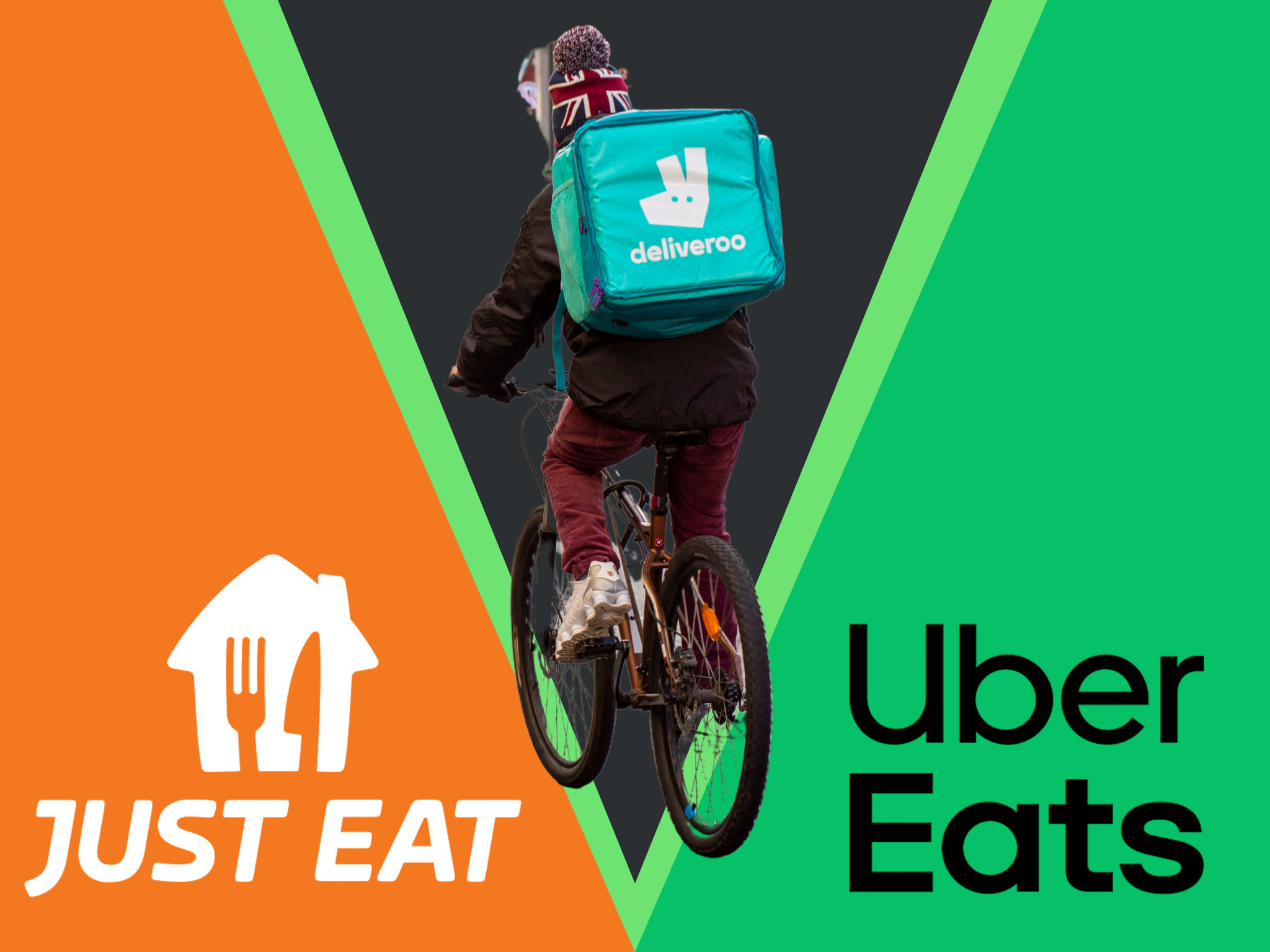Deliveroo, Uber Eats & Other Food Delivery Services Lack Meat Reduction Strategies
5 Mins Read
The world’s top food delivery services are failing to implement strategies to reduce meat and dairy consumption, despite the climate emergency.
Despite an uptick in vegan food options, most food delivery apps promote these meals temporarily, and lack long-term, concrete strategies for reducing animal-derived foods, a study has found.
Animal rights organisation Four Paws analysed 18 food delivery services in Europe, the US and South Africa to rank their climate, meat and dairy reduction goals, animal welfare policies, and vegan food offerings. These companies were found to be lacking in their efforts to curb meat and dairy consumption, despite these foods making up 57% of global agricultural emissions.
Only three have raised the topic of animals: Thuisbezorgd (the Dutch subsidiary of Just Eat) mentioned welfare in a blog post in connection to people’s shifts to plant-based; Just Eat Switzerlad referred to animal husbandry in its trends report for 2022; and Deliveroo mentioned animal health in a materiality matrix in its 2023 report.
But none of them have any policies to protect animal welfare. “Food delivery services really need to start delivering on animal welfare. When ordering out, it makes a big difference for animal welfare and the climate, whether you choose a meat burger or a vegan pizza,” says Sonja Svensek, head of nutrition at Four Paws.
“This is why it is so essential that food delivery services support their partnering restaurants and consumers in making animal-friendly choices,” she adds.
Just Eat Takeaway.com leads climate goals, but they’re still poor

The 18 services are subsidiaries of five major global food delivery services: Deliveroo, Delivery Hero, DoorDash/Wolt, Just Eat Takeaway.com, and Uber Eats.
The research found that Just Eat Switzerland topped the ranking with 32 points out of 100, followed by the brand’s UK operation, which scored 27 – although this overall rank was still classed as ‘poor’. Both showed equally positive initiatives towards meat and dairy reduction and climate goals, however, earning 16 points of 40 for this category.
Four Paws revealed that several leading companies have made references to the negative environmental effects of animal proteins in their annual reports or by developing concrete initiatives. Just Eat Takeaway.com, for example, acknowledged that “animal-based products have on average higher emissions per kg of product compared to plant-based products” in its 2022 emissions report submitted to the Carbon Disclosure Project.
Its UK and Swiss subsidiaries have worked with carbon calculator startup My Emissions to access the climate footprint of meals, enabling restaurants to understand how sustainable their dishes are, and allowing consumers to make more planet-friendly choices.
Just Eat UK also provided sustainability guides to partners, addressing the impact of animal-based foods, as well as topics like sustainable packaging and green operations. Its German and Austrian subsidiaries, under the brand name Lieferando, further highlighted the livestock-climate connection in either their reports or on their websites.
However, it’s unclear whether Just Eat Takeaway.com’s carbon labelling schemes and restaurant sustainability guides will extend to other geographies too.
Meanwhile, Deliveroo’s annual report for 2023 – which recognised beef as the highest polluting food – had a section on a hypothetical meat tax. If such a levy were to be imposed, the company said it would advise restaurants and grocers to promote plant-based products and dishes.
“Although this was only a risk mitigation strategy to avoid costs being passed on to the consumer rather than a self-motivated climate strategy, it is positive to see that Deliveroo was aware of the emissions problem of beef and saw plant-based dishes as a solution,” Four Paws states in the report.
How food delivery companies fare on vegan food

Just Eat Switzerland came out on top in terms of the availability of plant-based food, scoring 14 out of 20 points. This was followed by the company’s subsidiaries in the UK, the Netherlands (Thuisbezorgd), and Germany (Lieferando).
Postmates US and Uber Eats Netherlands scored the lowest on this metric (one point), and also overall, since this was their only point across the ranking.
Of the 18 services, 11 mentioned increasing vegan offerings. But only Just Eat UK, Switzerland, Lieferando in Germany and Austria, Thuisbezorgd and Deliveroo had “vague plans” to up the availability of vegan food on a temporary basis.
Just Eat Takeaway.com developed a Veganuary initiative to inspire consumers about meat-free dishes across 15 markets (although it’s not clear if GrubHub was part of the initiative). Its local efforts include partnerships with Planted and Garden Gourmet and 20% discounts on plant-based orders during Veganuary in Switzerland, plus awards for best vegetarian/vegan restaurants in Germany and Austria.
Similarly, Deliveroo launched limited-edition special dishes for Vegan-ooo-ary in the UK. Meanwhile, Uber Eats Germany offered a 20% discount on vegan dishes on Earth Day, and posts regularly about plant-based food on social media, unlike its operations in other countries.
Four Paws has sent a commitment letter to each of the 18 food delivery companies, outlining goals across the three categories to be achieved by 2028. These include implementing a meat and dairy reduction goal (without compensating these with other animal proteins), phasing out factory-farmed products, and ramping up vegan food options and in-app promotions on these.
“With the sector booming, it is high time these companies are living up to their responsibility to protect animal welfare and the climate, which should be reflected within their CSR policies,” says Svensek. “Delivery services can raise awareness about the importance of a plant-based diet promoting vegan dishes more visibly on their ordering platforms.”



